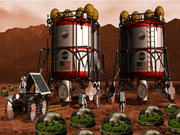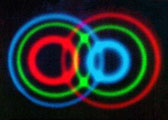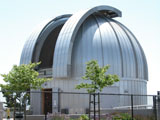


[Popular Science] If we ever decide to colonize Mars, it might be fairly simple to grow crops in that red soil, according to a new study. Mars’ reduced gravity could let us use less water and fertilizer than we do on Earth. Martian gravity is about one-third as strong as Earth’s, meaning water would flow at a slower rate. To study this effect, researchers simulated both Mars- and Earth-gravity root processes using BIOTOUGHREACT, a model of soil nutrient transport and microbe dynamics developed at Berkeley Lab. More>
 Berkeley Lab employees are invited to attend a talk by Anton Zeilinger of the University of Vienna and Austrian Academy of Science on Tuesday, Sept. 7, at 5 p.m. in Berdahl Auditorium (105 Stanley Hall) on campus. Zelinger will discuss “Fundamental Experiments with Entangled Photons:
Status and Future Prospects.” The lecture is sponsored by UC Berkeley’s Department of Chemistry.
Berkeley Lab employees are invited to attend a talk by Anton Zeilinger of the University of Vienna and Austrian Academy of Science on Tuesday, Sept. 7, at 5 p.m. in Berdahl Auditorium (105 Stanley Hall) on campus. Zelinger will discuss “Fundamental Experiments with Entangled Photons:
Status and Future Prospects.” The lecture is sponsored by UC Berkeley’s Department of Chemistry.
 Due to construction in the Cafeteria, there will be pots and pans transported between the dish room and the kitchen through the service area during business hours. The work should be completed by the end of September.
Due to construction in the Cafeteria, there will be pots and pans transported between the dish room and the kitchen through the service area during business hours. The work should be completed by the end of September.
Starting Monday, tree trimming will take place north of the U5 lot below Buildings 85 and 71 and extending to the Building 90 area. Some parking stalls in this area may be affected for a few days. Also, paving work is planned for the road and bench below Building 31 starting Tuesday. The work will be completed by Friday.
 Lab employees interested in volunteering for the Chabot Space and Science Center in Oakland are invited to attend an orientation session on Saturday, Aug. 28, from 10 a.m. to 2 p.m. The center is looking for exhibit guides, telescope operators, and assistance with special events. Go here to register.
Lab employees interested in volunteering for the Chabot Space and Science Center in Oakland are invited to attend an orientation session on Saturday, Aug. 28, from 10 a.m. to 2 p.m. The center is looking for exhibit guides, telescope operators, and assistance with special events. Go here to register.
Today
at Berkeley Lab encourages feedback and story ideas
Deadline for submissions is 10 a.m. two days prior to publication
TABL is produced by Public Affairs' Communications Group